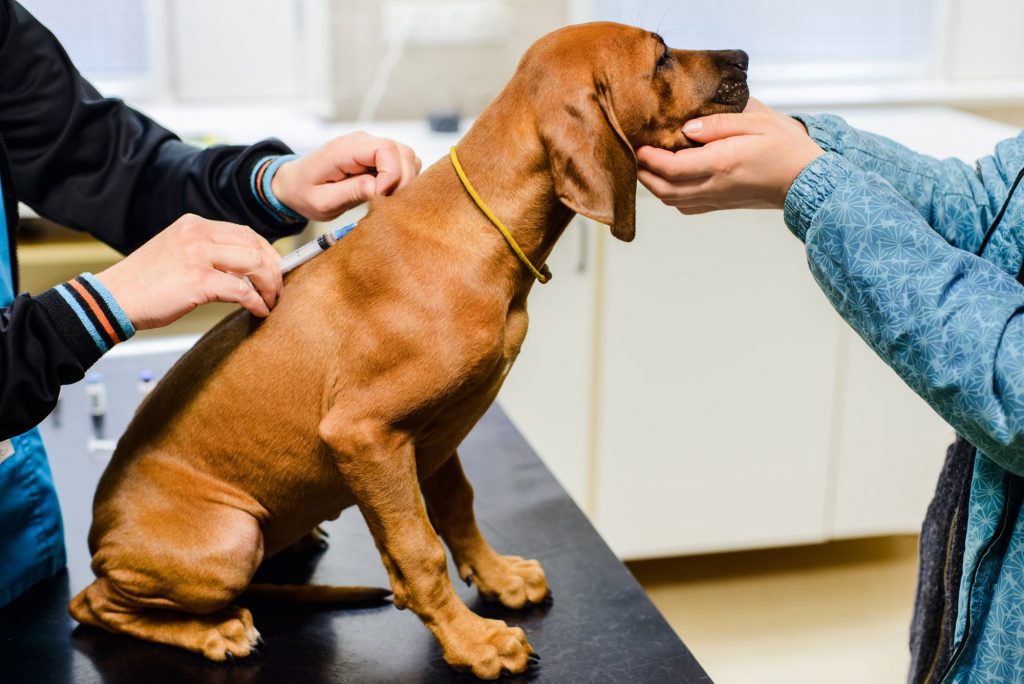Understanding Dog Vaccines

Most pet owners are on board with the fact that their dog needs some vaccinations to keep their furry family member safe and healthy. But what vaccines do dogs need? Are dog vaccines safe? When do you start to vaccinate a puppy? Dupont Veterinary Clinic has all the information you need when it comes to understanding dog vaccines.
What is a Dog Vaccine Really?
Vaccines are a way to help the body’s immune system be prepared to fight off certain disease-causing organisms like bacteria and viruses. When a vaccination is administered, it stimulates the immune system in such a way as to allow it to see its enemy and be better prepared to fight off that organism should it ever be exposed again.
Some vaccinations elicit a strong immune response that lasts a long time, whereas others need to be repeated, or boostered, at a given interval. Which vaccines are recommended for an individual pet depends on the pet’s exposure risk and lifestyle.
When Do I Need to Vaccinate?
Puppies should start their vaccinations around 6 weeks of age and must receive a series of boosters in order to provide full protective immunity. Most pets are not fully vaccinated until around four months of age.
Dogs also need to have a vaccine booster at about one year of age. Thereafter, frequency of vaccination depends on the duration of immunity provided (for instance, the leptospirosis vaccine must be boostered yearly while some rabies vaccines only need to be given every three years).
Vaccine Safety
Many people wonder if dog vaccines are safe, and, in general, the answer is yes. No medicine or vaccine is totally without risk, but the risk of your pet being exposed to a serious disease is much higher. Most pets who experience reactions have short-lived pain or soreness at the injection site or mild reactions such as hives. While a life-threatening reaction is possible, they are extremely rare.
What Vaccines Do Dogs Need?
Almost all pets need vaccines of some kind to stay healthy and safe. Indiana state law requires that all dogs over three months of age be vaccinated for rabies and kept current throughout his or her lifetime.
Young puppies and kittens and older pets are also at increased risk of communicable diseases due to decreased immune function. It is important to protect them as much as possible. Pets that travel, go to boarding kennels, or frequent daycares or grooming salons are also at increased risk of disease exposure.
So what vaccines do dogs need? To a certain extent, the vaccinations that your pet should have may vary. Our team evaluates each individual patient for lifestyle and environmental risks that may lead us to recommend certain vaccines for one dog and others for a different pet.
Dog vaccines can be divided into core vaccines that we recommend for virtually all dogs and non-core vaccines that we may or may not recommend based on your pet’s needs.
Vaccinations that your pet may need include:
- Rabies—This core vaccine protects pets and their people against the rabies virus, which can cause progressive neurological disease and death. It is required by law in our state.
- Canine distemper—Another core vaccine, protection against the distemper virus prevents this serious and often fatal respiratory and nervous system disease
- Infectious hepatitis—This core vaccine against adenovirus-1 can prevent contagious liver inflammation.
- Parvovirus—Vaccination against parvovirus is considered core when protecting dogs against this often fatal gastrointestinal virus that can lead to sepsis.
- Parainfluenza—At-risk patients can be protected from this serious respiratory disease.
- Leptospirosis—The bacteria Leptospirosis can lead to serious kidney and liver failure and can be transmitted from animals to people via infected urine.
- Bordetella—This bacteria that is often implicated in respiratory outbreaks can be vaccinated against, lessening the length and seriousness of any contracted infection.
- Canine influenza—A newer concern for dogs, canine influenza can cause contagious and potentially serious respiratory infections.
- Lyme disease—This tick-borne disease can lead to blood problems, joint pain, and kidney disease. Vaccination can help prevent infection.
Pet vaccinations are an important part of keeping our furry family friends healthy.
Some diseases that vaccinate for, such as kennel cough, can be uncomfortable for the pet, annoying and costly for you as their caretaker, and highly contagious to other pets.
Other diseases that we vaccinate against such as parvovirus and distemper can make our animals very sick and even result in death.
Other diseases carry a zoonotic risk, which means that they can infect people as well as pets. Besides rabies, leptospirosis is also a big concern in this department. It is a serious disease that can cause kidney and liver failure, and over half of people who contract it do so from their pets.
Dog vaccines are an important part of any pet wellness program and included in the care of most pets at Dupont Animal Clinic. Please contact us with any questions or concerns about vaccines for your pet. We are happy to help protect them and your family.

